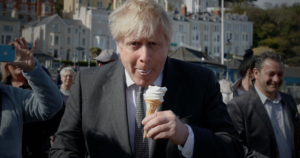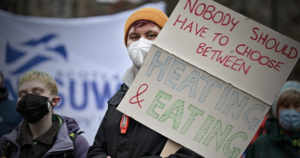Coll Mccail | Twitter
Coll Mccail is an activist and eco-socialist living in Edinburgh.
The real reason Scots have to “think twice” before phoning an Ambulance this winter
On the 15th of September, Humza Yousef told the public that they should “think twice” before calling an ambulance. Only if it was “absolutely critical” were Scots to dare dialing 999. The Health Secretary’s comments came in response to the tragic news that a Glaswegian man of 65 had died after a 40 hour wait for an ambulance.
Seventy years ago, upon founding the NHS, Nye Bevan declared that ‘no society can legitimately call itself civilised if a sick person is denied medical aid because of lack of means.’ Today, given that as of mid-September just 70% of patients in Scottish emergency rooms were seen within 4 hours, Scotland teeters on the edge of failing Bevan’s age-old test.
SNP ministers cite the pressure the pandemic has placed on the health service. On the other side of the fence, opposition parties attack the government’s lack of grip. But the crisis in our public services is not just down to extenuating circumstances and ministerial incompetence alone. The crisis in our NHS and our public services is the result of the SNP’s failure to stand up against the prevailing neoliberal orthodoxy of our times. For all that the party claims to ‘stand up for Scotland’, it has bowed down before the diktats of the free market and the rigged rules of the City.
My point is this. SNP run cities are in crisis, SNP run services are in crisis. To blame this on incompetence is the easiest thing to do, I grant you. But it’s not the whole picture. Today, wherever we look, whether it be to our own funding-starved councils or to the impact of the forty year ideological assault on the British state, examples of the suffering inherent to the free market are in no short supply. And yet, contrary to their rhetoric, 14 years of SNP rule has seen no attempt to depart from this collapsing status quo. Their cumulative apathy to public service, rooted in the party’s lack of ideological base besides nationalism, is the reason Scotland’s health service is at its weakest, and Glasgow at its dirtiest. Michael Russell – whose right-wing treatise “Grasping the Thistle” backed private sector competion within the NHS – has been charged with post-independence planning because a watered down draft of thistle grasping is how the SNP have governed: austerity, individualism and putting a shine on the bonnet of capital.
The tragedy for socialists like me is to think of what could have been done in Scotland had the SNP acted over these last few years – and what they could still do now if they found the courage to act.
It’s easy to forget that since 2014 the Scottish government’s revenue budget has increased by 3.1%. Yet, in the same timeframe, total revenue for Scottish local government has fallen by 2.4%. This austerity comes in addition to slashes in budgets for the provision of alcohol and addiction services. These cuts, which demonstrate a complete neglect for the people who rely on these services, have seen the number of Scots who lose their lives to drugs rise for 7 consecutive years.
Whilst having the worst record on drugs deaths in Europe has forced the government to pledge investment, the SNP’s right-wing economic stance is survived by their position, or lack of, on the Cambo oil-field off the coast of Shetland. Ending fossil field extraction is fundamental to saving the planet, as is a departure from the free market profit model the SNP’s tenure has protected. Yet rather than using their agency as Scotland’s largest party to throw their weight behind the ‘Stop Cambo’ campaign, the SNP remain firmly on the fence. Their opposition to the new oilfield would change the debate entirely, it would make whether to drill or not a question of democracy. It would mean extraction being carried out against the will of the elected Scottish executive. But without an ideological foundation, and in fear of sending the wrong message to communities dependent on the oil industry (in reality, the few jobs Cambo will create will be in the production of materials and will largely be shipped abroad), this opposition looks unlikely.
If the SNP were genuinely interested in improving the lives and livelihoods of the Scottish population, they would take the opportunities granted by devolution. Take the removal of the £20 uplift in Universal Credit as an example. This week, Nicola Sturgeon wrote to Boris Johnson to condemn the move, stating it would create an “unprecedented squeeze” for millions across the UK. She’s right, ripping away the uplift is reprehensible. But, if her government honestly wanted to alleviate the effects of the Tory’s barbarism, they would instantly double the Scottish Child Payment to £20. This is something the party promised to do within the lifetime of this parliament, but what better time to act than now? The Universal Credit cut will take £1000 a year from an estimated 176,000 Scottish households. With a quarter of Scottish children already living in poverty, you’d hope the government would not need any more incentive to double the payment. Yet, even with the cut to universal credit, they have neglected to help struggling Scots.
The constitutional debate is so polarised that providing the SNP oversee the perseverance of the status quo, their electoral coalition will remain. Safe in this knowledge, SNP politicians can neglect our services for as long as their dominance remains.
Now, more than ever before, Scotland’s services need to be there for their people. Our education system needs to be torn apart and rebuilt in dialogue with students. Our health service has to be properly funded so as to cope with the combined pressure of winter and the pandemic. Not for the sake of Joe Biden, but for the sake of its residents, Glasgow’s streets need to be clean. However, the SNP are not interested in the radical alternatives these issues require. Their carelessness is ideological. On their watch, Scotland’s services have crumbled, not because of ministers not doing their job but because of an innate lack of ideological direction. An electoral coalition which pulls on those from all walks of life, in the way the SNP’s does, will never implement serious systemic change, aside from constitutionally of course.
Nye Bevan was a socialist. In establishing universal healthcare he ensured the community paid for the misfortune of the individual. But the SNP are simply nationalists, how can a party united only by its belief in an independent Scotland devise a coherent strategy to manage the health service? Well, quite clearly, it can’t. A political project like the SNP can, and will, only maintain the social order it inherited, and in so doing protect structural inequality. Naturally then, the party resorts to a ‘pro market’ ideology’. In an age characterized by crisis, whether it be climate change or poverty, this can never be good enough.






